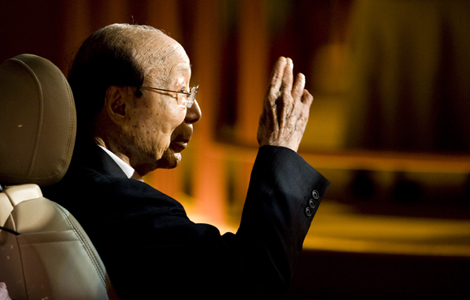Standing up for laughs
Updated: 2014-01-19 00:51
(China Daily)
|
|||||||||||
"I got the loudest round of applause because I had an element of surprise. No one expects this young Chinese woman to be talking about religion and abortion and newsgathering. I remember riding home and thinking 'that was the best night of my life'."
Li not only loves making people laugh but also the freedom stand-up gives her to tackle sensitive topics often not discussed in public life.
"There is a saying: 'It's funny because it's true'," Li says.
"I think comedy has an inbuilt integrity because you have to speak the truth because if it's not true, its not funny … I like the built-in demand for honesty — not just honesty but brutal honesty — that is just so attractive to me."
Three years after that debut performance, Li is one of Beijing's promising young comedians, regularly taking the stage to entertain audiences with her distinct brand of deadpan humor.
Traditionally, comedy in China has been the domain of xiangsheng, or cross-talk, a folk art with a nearly 200-year history in which two performers engage in a verbal rally of stories and puns.
Stand-up, by comparison, is more relaxed and has a unique appeal.
There's no need to memorize large tracts of material. And there are no hard and fast rules.
A performer stands in front of an audience and tells jokes and makes observations on any topic and in any style. All you need is a microphone, an audience and the courage to get up.
The Hot Cat Club in Beijing's Fangjia Hutong hosts two stand-up comedy nights a week — an English-language night on Wednesday and Chinese-language on Saturday. And ticketed showcase events, in both English and Chinese, are regularly held throughout the city.
"I feel the more individualized style of comedy suits more Chinese and this new generation of Chinese people," says Chinese-American comedian Joe Wong.
"It's more personal, and it has a sense of reality to it. With xiangsheng, they usually make up a fake story and talk about that story for 20 minutes and slip in a joke once in a while. So with stand-up comedy you basically go onstage and say: 'How do you feel about these things? How do you feel about this world?' And (you) make that funny. So that's a very different angle."
Wong moved to the United States in 1994 to study chemistry at Rice University in Texas. A promising career as a scientist followed. But in the early 2000s, he gave it up to pursue his true passion — stand-up comedy.
Having never lost his Chinese accent, his act in English played on the US immigrant experience and gained him a strong fan base. When his filmed address at the Radio and Television Correspondents dinner went viral on Chinese social media, he found himself unexpectedly popular in his homeland.
Since moving to Beijing in July last year to pursue television opportunities, Wong has set about promoting stand-up — this time in his native tongue.
"When I first got here it was really painful … every time I had some material I wanted to try out, I had to go to a college to give a lecture. And the students were really enthusiastic. But after a while I was like: 'I can't just do colleges because the students are slightly different than the general public."
That was when he stumbled upon the open-mike night at Hot Cat Club — then a struggling venture. Wong used his star power to promote the club on Sina Weibo, China's micro blog platform, and became a semi-regular fixture at the night.
"The thing is, with stand-up comedy in China — it's strange," he says.
"All the performers have at least a college degree or more. You get PhDs doing comedy, and the audience members are almost the same … sometimes, I deliberately go to a xiangsheng club just to trial material on xiangsheng fans."
But Wong says comedy isn't something only the highly educated can enjoy.
"As long as you have good material — people get it — I think the most common mistake is to underestimate the audience."
Related Stories
Singers stage duet for comedy 2013-12-30 14:30
'Voice of China' musical comedy premieres in Beijing 2013-12-24 14:55
China's first '5-D musical comedy', with a bite 2013-10-25 15:01
Sandra Bullock: I will do comedy 'until the day I die' 2013-08-30 10:02
Paris Hilton arrives at 'Comedy Club' in Jurmala 2013-08-05 10:26
International comedy duo to perform in Guangzhou 2013-06-08 09:55
Today's Top News
Pressure rises on treating China's pollution
Beijing wants to attract more foreign experts
Looming baby boom no sweat: officials
Dumpling appetites grow after Xi drops in
Investment pact 'means better market access'
London sees RMB transactions rise
Li delivers economic reform vow
Obama bans spying on allies
Hot Topics
Lunar probe , China growth forecasts, Emission rules get tougher, China seen through 'colored lens', International board,
Editor's Picks

|

|

|

|

|

|





